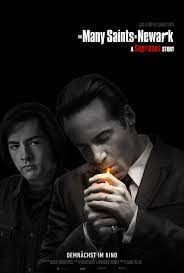![]()
USA 2021
Opening November 4, 2021
Directed by: Alan Taylor
Writing credits: David Chase & Lawrence Konner
Principal actors: Alessandro Nivola, Leslie Odom, Jr., Vera Farmiga, Michael Gandolfini, Michela de Rossi, Ray Liotta
 The TV show The Sopranos aired for six seasons from 1999–2007 and is generally acknowledged to be one of the best television series ever created. Viewers were captivated by the show’s depiction of an Italian-American Mafia boss, Tony Soprano (played in the series by James Gandolfini), and his larger-than-life persona, his two families—both his literal family and his Mafia family—and the way Tony was portrayed as a complicated, multi-faceted man. So, it’s no wonder that the show’s creative team decided to create a full-length movie prequel to show how Tony Soprano came to be the head of a crime family.
The TV show The Sopranos aired for six seasons from 1999–2007 and is generally acknowledged to be one of the best television series ever created. Viewers were captivated by the show’s depiction of an Italian-American Mafia boss, Tony Soprano (played in the series by James Gandolfini), and his larger-than-life persona, his two families—both his literal family and his Mafia family—and the way Tony was portrayed as a complicated, multi-faceted man. So, it’s no wonder that the show’s creative team decided to create a full-length movie prequel to show how Tony Soprano came to be the head of a crime family.
Set in Newark, New Jersey, in the late 1960s and early 1970s, The Many Saints of Newark depicts the world in which Tony Soprano grew up. The movie starts in 1967 when Tony is a boy completely enamored of his “uncle” Dickie Moltisanti (Nivola), whose Italian last name provides the movie title’s “many saints”. Dickie is an associate of Tony’s father “Johnny Boy” Soprano (Jon Bernthal) in the DiMeo crime family, and when Johnny Boy is sent to prison for a few years, it’s Dickie who takes Tony under his wing. For much of the early part of the movie, Tony is a passive and silent observer, watching Dickie as he goes about his daily business. He’s an observant kid, shown to be smart and driven. Dickie, the star of the movie, is a seemingly charming man, who is revealed to be a compulsively violent man, and the things that Tony witnesses are nothing compared to what Dickie gets up to when he’s one-on-one with people who’ve betrayed him, or when he’s exacting revenge on his enemies.
The film uses the race riots that happened in Newark in 1967 as a backdrop for depicting the racial hostility between Dickie and Harold (Odom), a Black man who went to high school with Dickie and now works for him but has become disillusioned by the fact that he’ll always be the crime family’s Black lackey. Unfortunately, rather than really get into the meat of racism in America—or the meat of the many issues the film touches on—this is mostly a plot device, and the film uses a montage of period music and passing references to Vietnam and the draft, systemic racism and white flight, and “counterculture” clothing and marijuana usage to stand in for an era in American history. It’s a movie that’s trying to introduce too many of the characters through linkages to their well-known counterparts from the TV series, from the iconic gangsters that make up the adult Tony Soprano’s crew, to his cold mother Livia (Farmiga). But by doing too many things, it never really succeeds at delving deeply into how young Tony becomes the adult we know. Michael Gandolfini (the real-life son of James Gandolfini) gives an excellent performance as the teenage Tony, in an incredible channeling of his father’s character, providing a glimpse of the intelligence and humor and conflicts within a boy who knows he needs to make a choice about the direction his life will take. But his uncanny performance is not enough to save this entertaining big-screen story from being a disappointingly busy, yet superficial look at one of the most interesting characters created for the small screen. ()
